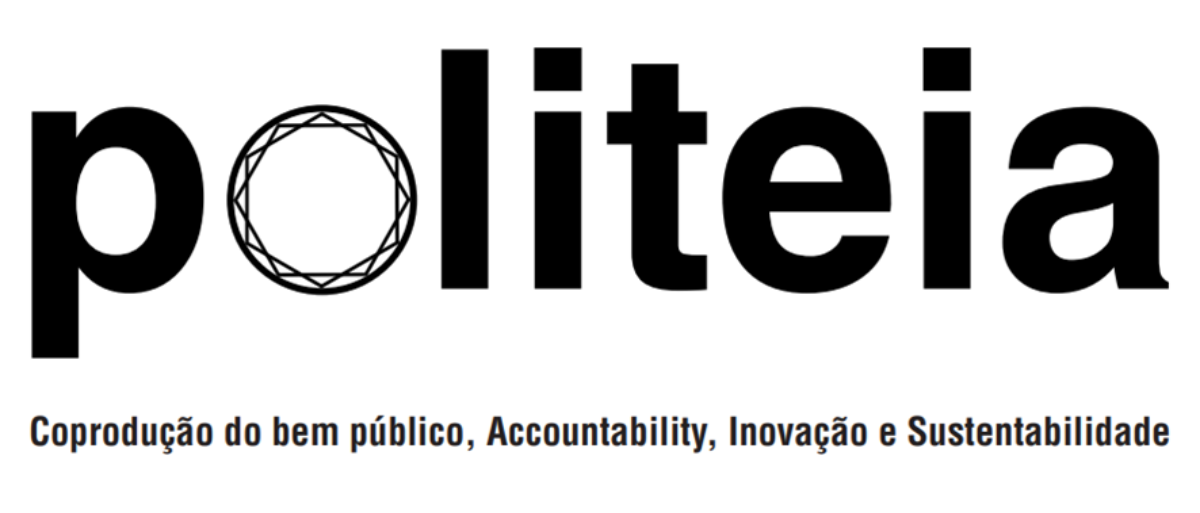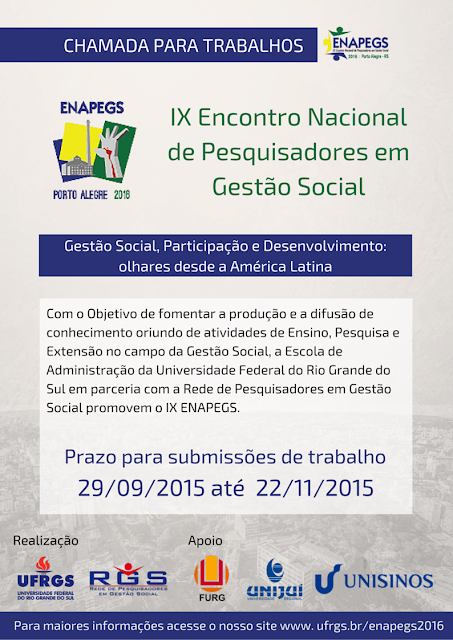Invited Editors
Cláudia Cristina Bitencourt – Unisinos/Brasil
Luciano Barin Cruz – HEC Montreal/Canada
Emmanuel Raufflet – HEC Montreal/Canada
Submission deadline: February 15, 2016
Issue estimated: July/August/2016
Societal problems represent both opportunities and challenges for organizations. Issues such as poverty, climate change and inequality can be seen either as a burden or as a source for innovation. Multinational Corporations, Non-Profit Organizations (NGOs), Cooperatives and Social-Purpose Organizations have engaged in projects that can tackle some of these major societal issues.
Social innovation has emerged in recent years as an area of interest for scholars and practitioners (Nicholls et al. 2015). Although it has been discussed under different definitions, we refer to social innovation here as “new organizational and institutional forms, new ways of doing things, new social practices, new mechanisms, new approaches and new concepts that give rise to concrete achievements and improvements.” (CRISES, 2004:1).
The purpose of this Special Issue is to encourage scholars to view social innovation under different perspectives. We acknowledge the extent of empirical experiences based on different parts of the world and we wish to propose an open and systematic debate on theories influencing social innovation, methods used to study social innovation, managerial aspects of social innovation and types of social innovation.
This call is structured on the following (non-excluding) issues:
Theories influencing social innovation: Institutional theory (Barin Cruz, Delgado, Leca & Gond, forthcoming; Mair, Marti & Ventrasca, 2012), strategy (Herrera, 2015), and leadership (Marcy, 2015), resourced-based-view and competencies (Hart, 1995; Bitencourt & Oliveira, 2014; Berti & Bitencourt, 2012), organizational learning and learning based on social spaces (Chalmers, 2012; Mozzato & Bitencourt, 2014) are examples of theories that have been used to analyse SI in management. What is the potential of these theories in contributing to the SI issue? What other theoretical approaches have the potential to advance SI literature? What are possible contributions
by theories from other fields (e.g. geography, political science, sociology, etc.) to explain further the SI phenomena? Is there such a thing as an SI theory or it is a phenomenon that needs an inter-disciplinarian approach to be explained and understood?
Research Methods and social innovation: SI can be understood from diverse angles (e.g. product, process, organizational form, outcomes, etc.), multiple methods can help to map, define and conceptualize social innovation and advance literature in the field. SI is also viewed as a research process per se which shifts the role of researchers to co-creators of social innovation. Which methods and epistemological approaches are mobilized to
analyze different types of SI? From an epistemological dimension, what are the experiences of co-creating social innovation among researchers and actors? From a methodological viewpoint, what are the respective advantages
of qualitative and quantitative methods in this field? How to use mix methods in the area and what are their potential and limitations? What are the implications of different data collection and analysis techniques?
Organizational aspects: “Managing” SI may be an oxymoron. For “managers” it is challenging and differs widely depending on the circumstances. In the case of social purpose organizations, sometimes, the use of traditional managerial tools and processes may not be adequate (Brown, 2015; Bitencourt et. al., 2014; Raufflet, Berranger & Gouin, 2008; Raufflet & Gurgel, 2007). We would like to explore several aspects of SI management. How is the SI development process (from an idea to its implementation)? What are the related SI phases and levels? How is the
cooperative relationship between different agents involved in the SI unfolding process? What are the SI governance challenges?
Types of social innovation: SI can be seen as a product and a process. It can also be an organizational form with a social purpose, such as cooperatives (Leca, Gond & Barin Cruz, 2014), NGOs, social businesses (Yunus, Moingeon & Lehmann-Ortega, 2010), as a project with a social purpose in a traditional company (Porter & Kramer, 2011), as well as processes between organizations. Considering these multiple types of social innovation, we encourage studies aimed at issues such as: What are the facilitators and inhibitors involved in SI?; What is the impact of SI (transformations and other results) at different levels (individual, organizational, institutional)? How to evaluate the impacts and effects of social innovation? Do different types of SI always produce social transformation? Can social transformation be negative? What is the role of social entrepreneurs in social innovation?
This special issue welcomes submission of theoretical and/or empirical qualitative or quantitative studies, with a clear contribution to the advancement of knowledge in one or more of the four areas previously approached.
It must be noted that RAM will only accept unpublished journal papers.
Papers submitted in conferences are allowed. For this Special Issue, only papers written in English will be accepted.
Interested authors are strongly encouraged to submit their papers for review and publication. All articles judged suitable for consideration will be reviewed in a double peer review process.
Authors can submit papers online to “Social Innovation” section at
http://editorarevistas.
– At IDIOMA, select English.
See main page of RAM at:
http://editorarevistas.
References :
Barin Cruz, L.; Delgado, N. A.; Leca, B. & Gond, J-P. Institutional
Resilience in Extreme Operating Environments: The role of Institutional
Work. Business & Society, (forthcoming).
Berti, A.; Bitencourt, C.C. A dinâmica das competências organizacionais na
venda de calçados por catálogo: o caso da Azaléia Colômbia (2012).
Espacios Vol. 33, pp. 5, 2012.
Bitencourt, C. C. ; Oliveira, T. R. (2014). Dependência e Criação de
Trajetória na Organização Não Governamental Parceiros Voluntários.
Revista de Administração Contemporânea, Vol. 18, pp. 328-350.
Bitencourt, C. C. ; Brito, A. N.; Fagundes, P.; Villwock, L.H; Culleton, A.;
Rohden, I. (2010). Doing better by doing good: the experience of a community
network in Brazil. International Journal of Business and Systems Research,
Vol. 4, pp. 209-226, 2010.
Brown, Louise (2015). A Lasting Legacy? Sustaining Innovation in a Social
Work Context. British Journal of Social Work. (45)1, 138-152.
Chalmers, Dominic (2012). Social innovation: an exploratory of the barriers
faced by innovating organizations in the social economy. Local Economy,
28(1); 17-34.
CRISES. 2004. An Introduction to CRISES. See
http://crises.uqam.ca/upload/
Hart, S. L. (1995). A Natural-Resource-Based View of the Firm. The Academy
of Management Review, 20 (4), 986-1014.
Herrera, M. E. B. Creating competitive advantage by institutionalizing
corporate social innovation. Journal of Business Venturing. 68(7):1468-1474.
Leca, B., Gond, J-P. & Barin Cruz, L. 2014. Building ‘Critical
Performativity Engines’ for deprived communities: The construction of
popular cooperative incubators in Brazil. Organization. 21:683-712.
Mair, J., Marti, I., & Ventresca, M. J. (2012). Building inclusive markets
in rural Bangladesh: how intermediaries work institutional voids. Academy of
Management Journal, 55(4), 819–850.
Marcy, R. T. (2015) Breaking mental models as a form of creative
destruction: The role of leader cognition in radical social innovations.
Leadership Quarterly. 26(3): 370-385.
Mozzato, A.R.; Bitencourt, C. C. (2014). Understanding Interorganizational
Learning Based on Social Spaces and Learning Episodes. Brazilian
Administration Review, 11: 284-301.
Nicholls, A. J. Simon and Gabriel – 2015 – New Frontiers in Social
Innovation Research, available at books.google.com
Porter, M. E., & Kramer, M. R. (2011). Creating Shared Value. Harvard
Business Review: 62-77.
Raufflet. E, A. Berranger, J.F. Gouin, (2008), Innovation in
business-community partnerships: evaluating the impact of local enterprise
and global investment models on poverty, bio-diversity and development,
Corporate Governance Journal: The International Journal of Business in
Society, 8(4): 546-556.
Raufflet, E. & C. C. Gurgel, (2007), Bridging business and society: the
ABRINQ Foundation in Brazil, The Journal of Business Ethics, 73: 11-23
Yunus, M., Moingeon, B. and Lehmann-Ortega, L. (2010), “Building Social
Business Models: Lessons from the Grameen Experience”, Long Range
Planning, 43(2-3): 308-325.
Categoria: Uncategorized
Grupo Gestor da Rede de Atendimento à Criança e ao Adolescente de Rio do Sul é referência na atuação em rede
* Por Gláucia da Cunha, John Lenon Teodoro e Roberto Silveira Fleischmann
Para saber mais sobre as políticas voltadas a crianças e adolescentes e sobre o Grupo Gestor da Rede de Atenção à Criança e ao Adolescente de Rio do Sul, consulte:
- http://grupogestor.wix.com/site
- Estatuto da Criança e do Adolescente (Lei nº 8.069/1990)
- Sistema Nacional de Atendimento Socioeducativo – SINASE (Lei nº 12.594/2012)
*Gláucia da Cunha é mestranda em administração na Udesc/Esag, possui especialização em Auditoria de Gestão Empresarial pela Faculdade Estácio de Sá e graduação em Ciências Contábeis pela UFSC. É auditora fiscal de controle externo do Tribunal de Contas, atuando em auditorias operacionais, que visam a avaliação de políticas públicas e programas de governo.
* John Lenon Teodoro é graduado em Administração Pública pela Udesc/Esag, especialista em Gestão Pública pelo Instituto Federal de Santa Catarina – IFSC e atualmente é Secretário Municipal de Assistência Social em Camboriú.
* Roberto Silveira Fleischmann é mestrando em administração na Udesc/Esag, possui especialização em Auditoria Pública pela Fundação de Pesquisas Socioeconômicas (Fepese) e graduação em Administração pela Universidade do Vale do Itajaí (Univali). É auditor fiscal de controle externo do TCE/SC e atualmente ocupa o cargo de diretor de Atividades Especiais (DAE).
** Este texto foi desenvolvido no âmbito da disciplina Governança e Redes de Coprodução do Bem Público, ministrada pela Profa. Paula Chies Schommer, no Mestrado Profissional em Administração da Udesc/Esag.
“Governance and the Law” é tema de Fórum Virtual promovido pelo Banco Mundial para elaboração de seu Relatório 2017
A participação de pesquisadores brasileiros é importante para os debates, para compartilharmos nossas experiências e também conhecermos a perspectiva de vários outros países.
|
GPSA Knowledge Platform – Upcoming E-Forum
|
|||||||||||||||||||||
|
Engaging with Citizen Voices and Experiences: The 2017 World Development Report on Governance and the Law
With Stephen Commins, Carolina Cornejo,Lucia Nass, Joy Aceron and Janet Oropeza
|
|
||||||||||||||||||||
|
About the E-Forum
|
|||||||||||||||||||||
|
This 3-week E-forum will be held on the GPSA Knowledge Platform and will consist of an online discussion where multiple stakeholders are expected to share their views, knowledge and experiences in the field of governance and the law, including ways in which different practitioners seek to promote governance reforms and strengthen the responsiveness of legal systems.
The World Development Report 2017 on Governance and the Law seeks to understand how governance interventions can be more effective in generating sustainable welfare improvements in the long term, and self-reinforcing dynamics of inclusion. Typically, policy discussions and technical advice consider issues such as coverage and quality of education, provision of health services, investment climate, etc. to explain development performance. However, interventions to improve these abovementioned factors can fail if the underlying determinants, which constrain sustainable progress, are not first addressed. This refers to the way in which institutions are shaped, legitimized and equipped to deliver on such goals. Our understanding of policy options to address these underlying determinants, which are crucial for countries to achieve key development outcomes like growth, equity, and security, is lacking. In this context, the Report seeks to unpack the complex interactions between state institutions, power, social norms, and development outcomes to (i) explain cross-country (and within-country) heterogeneity and (ii) investigate processes of institutional change. By understanding better these interactions and these underlying factors, governance reforms may yield better outcomes.
The WDR 2017 team will utilize e-forum participants’ contributions as follows: (a) to have a reality-check on the WDR’s framework and main concepts; and (b) to identify specific country/case experiences that can be used to illustrate content of the Report.
This e-forum is one means through which the WDR 2017 will engage with external stakeholders working on governance issues. Over three weeks (from October 19 to November 6), this e-forum will aim to:
· Identify daily experiences and challenges of citizens with governance and the law;
· Reflect on the various factors that influence the quality of governance and the law in specific situations;
· Share good practices of engagement between civil society organizations and governmental agencies and ways to promote reforms in governance.
|
|||||||||||||||||||||
|
|
About the Facilitators
Stephen Commins is Associate Director, Global Public Affairs and Lecturer in Regional and International Development, at the Luskin School of Public Affairs, UCLA. He works with the WDR2017 team on external consultations and has written extensively on accountability and basic service delivery.
|
||||||||||||||||||||
|
|
Carolina Cornejo is Project Coordinator on Oversight Institutions at the Civil Association for Equality and Justice (ACIJ), a non-profit organization aimed at defending disadvantaged groups and strengthening democracy in Argentina.
|
||||||||||||||||||||
|
|
Lucia Nass is an independent consultant specialising in empowering local governance processes. She has gained over 25 years of experience in a variety of sectors, including agriculture, water and sanitation, rural energy, rural roads and pro-poor tourism. She is committed to gender mainstreaming.
|
||||||||||||||||||||
|
|
Janet Oropeza is the Knowledge Management Coordinator at Fundar, a civil society organization aiming to advance substantive democracy in Mexico. Janet has conducted research on governance, citizen participation, accountability, gender and human rights. Her areas of expertise also include knowledge exchange and online facilitation.
|
||||||||||||||||||||
|
Joy Aceron is Program Director at School of Government-Ateneo de Manila University directing Political Democracy and Reforms (PODER) and Government Watch (G-Watch). She has been involved in grassroots citizen monitoring of service delivery, procurement and program implementation of the government since 2004.
|
|||||||||||||||||||||
|
In order to participate in the E-forum, you will need to be registered to the GPSA Knowledge Platform and logged in. Create your account here.
|
|||||||||||||||||||||
|
|
|
|
|
|
|||||||||||||||||
Até 26 de Outubro de 2015 – Submissão de Trabalhos para a 12a Conferência Internacional da ISTR – The Third Sector in Transition: Accountability, Transparency and Social Innovation
O evento acontecerá em Estocolmo, na Suécia, de 28 de Junho a 01 de Julho de 2016
12th International ISTR Conference
Deadline for Submissions – 26 October 2015
The Third Sector in Transition:
Accountability, Transparency, and Social Innovation
- The Third Sector and the Welfare state
- Civil society and Democracy
- NGOs and Globalization
- Accountability and Transparency
- Social Innovation and Social Enterprise
- Advocacy and Public Policy
- Philanthropy and Foundations
- Volunteerism and Co-production
- Managing Third Sector Organizations
- Emerging Areas of Theory and Practice
Observação: o limite de 500 palavras não inclui as referências.
Seminário Finanças Sociais: Tendências Globais e Recomendações para o Brasil
O grupo Politeia estará presente!!

O Evento
O Seminário Finanças Sociais: Tendências Globais e Recomendações para o Brasil será um espaço para debater, compartilhar e identificar oportunidades e desafios na busca de mudanças sistêmicas para atrair mais capital para geração de impacto social. Reunirá representantes de organizações sociais, academia, setor privado, governo e todos aqueles que buscam novas conexões e conhecimento aprofundado sobre as perspectivas para o avanço dos Negócios de Impacto e Finanças Sociais no Brasil. Será também uma oportunidade para que você conheça as recomendações da Força Tarefa de Finanças Sociais para alavancar o crescimento deste campo no Brasil.
Mudanças Sistêmicas para alavancar mais capital
Há pouco mais de um ano, a Força Tarefa de Finanças Sociais vem encarando o desafio de buscar soluções sistêmicas para atrair mais capital para financiar inovações com impacto social e sustentabilidade financeira. Nesse período priorizou temas críticos, desenvolveu estudos, consultou a sociedade, o mercado e ongs e trabalhou em parceria pesquisadores para compreender quais mudanças poderiam contribuir de forma mais significativa para o campo. O resultado desse trabalho é um conjunto de recomendações para o avanço do campo de Finanças Sociais no Brasil, que serão apresentadas durante o evento.
ENAPEGS 2016 em Porto Alegre – Submissão de Trabalhos até 22 de Novembro de 2015
Detalhes no website UFRGS/Enapegs




